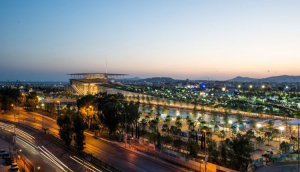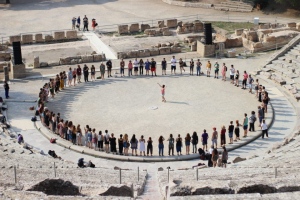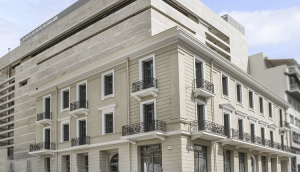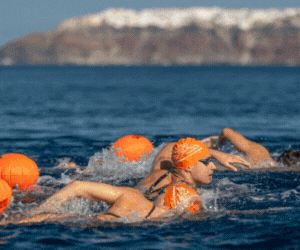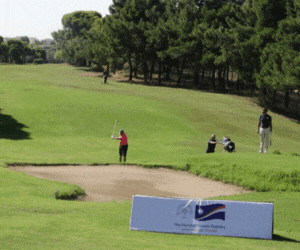XpatAthens
Thursday, 21 February 2019 07:00
Aspiring Writers Unite For The 7th International Creative Writing Summer School
Are you passionate about writing? Do you want to develop your writing, improve your critical thinking and discuss your work in small, focused groups? If so, you shouldn’t miss the chance to join the International Creative Writing Summer School that will take place in Athens and Thessaloniki in early June.
The International Creative Writing Summer School is one of the leading creative writing programs in Greece. The course is organized by the British Council and offers the unique opportunity to create original written work under the direction of some the most respected British writers and academics.
This year’s program will focus on short fiction, crime and thriller, novel and/or poetry and will involve critiquing and discussing work in progress as well as one-to-one tutorials.
Courses will be held in English, are suitable for writers at all levels, and will be scheduled from Monday to Friday between 18.00 and 21.00.
To learn more the International Creative Writing Summer School, please visit: The British Council
Published in
Local News
Tagged under
Tuesday, 26 February 2019 07:00
Record-Breaking 5.3 Million Visits To The SNFCC In 2018
Since opening its doors in 2017, the SNFCC has become a favorite destination for Athenians. Its gardens attract families with young children, its unique activities and workshops are usually fully booked long in advance, the library is a haven for scholars and bibliophiles, while the new Greek National Opera is an aesthetic and technological masterpiece.
According research conducted for the SNFCC and published by Kathimerini, “The SNFCC is most popular with visitors in the 18-29 and 30-44 age groups, which mostly includes families who take advantage of activities and the various SNFCC playgrounds. Most visitors go to the SNFCC to take a stroll in the park, have a coffee or a bite to eat, or to attend a cultural performance—primarily concerts or performances at the Greek National Opera. Visitors provided a positive evaluation of the SNFCC overall (99%), as well as in specific areas like cleanliness (99%) and visitor experience (90%)…”
Regarding the SNFCC’s great success with the Greek public, the cultural center’s CEO Nikos Manolopoulos said, “The public has embraced the creation of a unique project of cultural significance and environmental sensibility. The inhabitants of Attica in particular keep coming back to the SNFCC, validating the way it operates with their visits. We owe deep gratitude to the Stavros Niarchos Foundation, its Board of Directors and staff, and especially to its co-President, Andreas Dracopoulos, for the continued and active support and encouragement they provide to the SNFCC. We would also like to thank the Ministry of Finance for the exemplary way in which it oversees the project and the support it offers to the SNFCC.”
In 2018 alone, the SNFCC received 5.3 million visits, a high mark since its opening, fulfilling SNF's vision for a public space that is open and accessible to all!
Article Source: snf.org
Image Credit: SNFCC | GeorgeDimitrakopoulos
Article Source: snf.org
Image Credit: SNFCC | GeorgeDimitrakopoulos
Published in
Local News
Tagged under
Thursday, 21 February 2019 23:09
ACS Athens Alumni Achievement Award Event
The American Community School of Athens, will proudly honor alumna Stephanie E. Joannides, Senior Superior Court Judge, Anchorage Alaska, class of ‘71, with this year's “Lifetime Achievement Award,” acknowledging her professional achievements, exemplary leadership with ethos, and service to humanity.
This special event will take place on April 6 2019, at the Capital Hilton, Washington D.C., at 6:30 pm.
Professor Nicholas Burns, former US Ambassador to Greece and ACS Athens parent, will be the guestspeaker at the Award Ceremony.
Stephanie Joannides served as a judge on the State District Court, the State Superior Court and as a pro tem judge on the Alaska Court of Criminal Appeals from 1994 to 2011. Since then, she has been on senior status, presiding over civil and criminal cases, being involved in a variety of court projects and committees and sitting pro tem on the Criminal Court of Appeals.
With its 2nd Alumni Achievement Awards Event, ACS Athens takes the opportunity to invite members of its community across the globe and prominent professionals from all areas to this landmark event for a meaningful celebration, bringing together people who are changing the world!
For additional information and registration, visit acsathensglobal or contact Ms. Valerie Alexopoulos at alexopoulosv@acs.gr.
Entrance is $250 per person. All proceeds will go to alumni scholarships.
This special event will take place on April 6 2019, at the Capital Hilton, Washington D.C., at 6:30 pm.
Professor Nicholas Burns, former US Ambassador to Greece and ACS Athens parent, will be the guestspeaker at the Award Ceremony.
Stephanie Joannides served as a judge on the State District Court, the State Superior Court and as a pro tem judge on the Alaska Court of Criminal Appeals from 1994 to 2011. Since then, she has been on senior status, presiding over civil and criminal cases, being involved in a variety of court projects and committees and sitting pro tem on the Criminal Court of Appeals.
With its 2nd Alumni Achievement Awards Event, ACS Athens takes the opportunity to invite members of its community across the globe and prominent professionals from all areas to this landmark event for a meaningful celebration, bringing together people who are changing the world!
For additional information and registration, visit acsathensglobal or contact Ms. Valerie Alexopoulos at alexopoulosv@acs.gr.
Entrance is $250 per person. All proceeds will go to alumni scholarships.
Published in
Local News
Tagged under
Monday, 04 March 2019 07:00
Celebrating French Gastronomy In Greece And Throughout The World
For the 5th consecutive year the French Ministry of Europe and Foreign Affairs celebrates French gastronomy with a unique culinary celebration that will take place around the globe from 21 to 24 March 2019. Good/Goût de France is a gourmet festival to celebrate French gastronomy held across the globe! Thousands of dinners “à la française” on the five continents and nation-wide gourmet initiatives. This year’s focus is on socially and environmentally responsible cuisine. The festival was first introduced in 2015 following the inscription of the ‘Gastronomic Meal of the French’ on the UNESCO Representative List of the Intangible Cultural Heritage of Humanity.
In 2018, 83 restaurants in Greece took part in the Good/Goût de France event and created original menus to promote French gastronomy in Greece. The event is organized under the auspices of the French Embassy in Greece.
In addition to the Good/Goût de France event, the French Embassy in Greece is hosting MaziChef, a culinary contest in search of ‘The Best Greek Éclair’. The final is scheduled to take place at the French Embassy in Athens on Monday, March 18 following 4 regional selections in Athens, Thessaloniki, Patra and Chania. The embassy has gathered an impressive line-up of celebrated chefs that will to select the most delicious éclair.
Gastronomes get ready to fully appreciate the magic of French cooking in Athens this March!
For further information, please visit: The French Embassy in Greece
Published in
Local News
Tagged under
Monday, 11 March 2019 23:24
Win A Rockin' Meal At Hard Rock Cafe On St. Patrick's Day!
St. Patrick's Day is celebrated this year on Sunday March 17th and the Hard Rock Cafe Athens is about to be sham-rocked! Famous for its legendary burgers, and in tribute to Ireland's National holiday, the HRC Athens has a special menu running from March 13-17 to celebrate!
We wanted to make this year's St. Paddy's Day celebration extra special so we've teamed up with Hard Rock Cafe Athens to offer a fun and eventful experience in Athens!
Enter to win a Rockin St. Paddy's Day Menu for 2, including:
1. Seasonal salad for 2
2. Guiness burger per person
3. Lil brownie per person
4. St. Paddy’s shake for 2
HOW TO ENTER:
1. Visit our contest details visit us on Facebook HERE and/or on Instagram HERE.
The winner will be announced on Thursday March 14th. Good luck!
Published in
Local News
Tagged under
Thursday, 28 February 2019 16:07
Important Update - New Fee Structure On XpatAthens
As of March 1, 2019, we have introduced a new fee structure regarding how individuals can post on XpatAthens. Until now, we did not charge for individuals to post on XpatAthens, which includes uploading Classified and Event posts.
We have elected to introduce a small fee for uploading posts because we respect your contribution, value the work that we do, and want to enable our team to continue improving the quality of our content and services.
As you can also see on our permanently published advertising page here, the cost for posting is now:
Classified Posts:
1 Classified Post: €5 +vat (€6,20)
3 Classified Posts: €15 +vat (€18,60)
1 Year of Classified Posts (limited to 5 weekly): €20 +vat (€24,80)
Event Posts:
1 Event Post: €10 +vat (€12,40)
5 Event Posts: €50 +vat (€62,00)
1 Year of Event Posts (limited to 5 monthly): €75 +vat (€93)
1 Year of Event Posts for Non-Profits & Charities: No Charge
Accommodation Listings:
1 Year listing: €50 +vat (€62)
Directory Listings:
1 Year listing: €50 +vat (€62)
1 Year Listing for Non-Profits & Charities: No Charge
If you’d like to post on XpatAthens, you can do so by creating a profile here, once logged in you can select the type of post you’d like to upload and walk through the process of completing the form provided.
Of course, if you have any question, or would like to learn more about posting and / or advertising on XpatAthens, please feel free to reach out to us at info@xpatathens.com.
Published in
Local News
Tagged under
Monday, 11 March 2019 00:20
Carnival Celebrations Across Greece
Sunday, the last day before Lent, according to the Christian Orthodox calendar, saw the conclusion of Carnival celebrations in Greece. Helped by the sunny weather, many thousands took part in the parades and other Carnival celebrations all around Greece.
The best-known Carnival in Greece takes place in Patras, the country’s 3rd largest city. This year the Patras Carvival attracted some 40,000 visitors and included a Chinese troupe, “Flying Dragons and Dancing Lions - Team of Cuigezhuang Township”.
The Patras Carnival is most likely the most flamboyant and crowded, while places such as Naoussa in northern Greece and the island of Corfu base their celebrations on old traditions and retain a more authentic character.
To read this article in full, please visit: ekathimerini
To read this article in full, please visit: ekathimerini
Photo: Facebook
Published in
Local News
Tagged under
Tuesday, 12 March 2019 12:09
Epidaurus Lyceum 2019 – Applications Are Now Open!
The Epidaurus Lyceum – International Summer School of Ancient Drama will be active for the third year in a row in Epidaurus on 2 – 16 July 2019, in collaboration with the Theatre Studies Department of the School of Fine Arts of the University of Peloponnese, which also accredits the programme with ECTS credits.
Prospective students can now apply. For more information, terms and conditions, and application forms, prospective applicants may click HERE!
This year’s theme, Reinventing ancient drama on the contemporary stage will pervade all Lyceum classes and related events.
The 2019 teaching staff will include the following: Xu Jiali, actress and professor of Chinese Opera at the Shanghai Theatre Academy; Ichinosuke Umekawa, teacher and actor of Kabuki theatre; the dance group known as Sine Qua Non ART (Jonathan Pranlas – Descours and Christophe Beranger); Kamila Klamut, director, co-founder of ZAR Theatre and collaborator of the Grotowski Institute; Christiane Pohle, award- winning director and head of programme of the Academy of Performing Arts Baden- Wuerttemberg; Andrea De Rosa, director; Gabriele Vacis, director, writer and theatre scholar; Vangelis Theodoropoulos, director, and Anastasios Karakatsanos, composer and music teacher. Lectures and masterclasses will be given by the following: Kostas Georgousopoulos, writer, translator and theatre critic; Konstantinos Markoulakis, actor and director; Efimia Karakantza, assistant professor at the Department of Philology, University of Patras; George Sampatakakis, assistant professor at the Theatre Studies Department, University of Patras; Anna Tsichli, member of the special teaching staff at the Theatre Studies Department, University of Peloponnese; Maria Mikedaki, assistant professor at the Theatre Studies Department, University of Peloponnese, and Georgina Kakoudaki, director and theatre scholar.
The programme is realized with the support of the Institut Français de Grèce, the Istituto Di Cultura – Atene, the Ministry of Cultural Heritage and Activities in Italy, the Municipality of Epidaurus and the Ephorate of Antiquities of Argolis. The Epidaurus Lyceum is a member of the International Network of Ancient Drama of the Hellenic Ministry of Culture and Sports.
Prospective students can now apply. For more information, terms and conditions, and application forms, prospective applicants may click HERE!
This year’s theme, Reinventing ancient drama on the contemporary stage will pervade all Lyceum classes and related events.
The 2019 teaching staff will include the following: Xu Jiali, actress and professor of Chinese Opera at the Shanghai Theatre Academy; Ichinosuke Umekawa, teacher and actor of Kabuki theatre; the dance group known as Sine Qua Non ART (Jonathan Pranlas – Descours and Christophe Beranger); Kamila Klamut, director, co-founder of ZAR Theatre and collaborator of the Grotowski Institute; Christiane Pohle, award- winning director and head of programme of the Academy of Performing Arts Baden- Wuerttemberg; Andrea De Rosa, director; Gabriele Vacis, director, writer and theatre scholar; Vangelis Theodoropoulos, director, and Anastasios Karakatsanos, composer and music teacher. Lectures and masterclasses will be given by the following: Kostas Georgousopoulos, writer, translator and theatre critic; Konstantinos Markoulakis, actor and director; Efimia Karakantza, assistant professor at the Department of Philology, University of Patras; George Sampatakakis, assistant professor at the Theatre Studies Department, University of Patras; Anna Tsichli, member of the special teaching staff at the Theatre Studies Department, University of Peloponnese; Maria Mikedaki, assistant professor at the Theatre Studies Department, University of Peloponnese, and Georgina Kakoudaki, director and theatre scholar.
The programme is realized with the support of the Institut Français de Grèce, the Istituto Di Cultura – Atene, the Ministry of Cultural Heritage and Activities in Italy, the Municipality of Epidaurus and the Ephorate of Antiquities of Argolis. The Epidaurus Lyceum is a member of the International Network of Ancient Drama of the Hellenic Ministry of Culture and Sports.
Published in
Local News
Tagged under
Tuesday, 19 March 2019 07:00
Free Entrance To The Acropolis Museum On The Greek National Holiday
On the occasion of the Greek National Holiday on Monday 25 March 2019, the Acropolis Museum invites visitors to enjoy its permanent collection with free entrance from 9 a.m. to 6 p.m. Visitors will also be able to participate in walks through the Museum exhibition galleries, making unanticipated stops and various discussions, together with Archaeologist-Hosts.
Walks (in Greek): 12 noon, 1 p.m., 2 p.m., 3 p.m., 4 p.m.
Participation: For registration, please refer to the Information Desk at the Museum entrance on the same day.
Participation: For registration, please refer to the Information Desk at the Museum entrance on the same day.
Limited to 40 visitors per session. First-in first-served.
Families will also be able to receive the specially designed booklets from the Information Desk in order to have a pleasant and interesting visit at the Acropolis Museum.
On the same day the Museum restaurant will serve Greek traditional dishes.
Click HERE for valuable information about the Acropolis Museum in Athens.
Published in
Local News
Tagged under
Tuesday, 26 March 2019 07:00
The New Goulandris Art Museum In Athens Is Expected To Open On October 1, 2019
As announced in a recent press conference that the Goulandris Art Museum will open in just a few months, on October 1st, with a series of celebratory events.
Ship-owner Basil Goulandris and his wife Elise were active members of the art scene in Athens and Paris. Through their dedication to the arts and their travels, they accumulated an amazing collection of contemporary art that includes masterpieces by artists such as Pablo Picasso, Auguste Renoir, Henri Matisse, Vincent Van Gogh, and Claude Monet, as well as many prominent Greek artists.
The first plans for the museum of contemporary art of the B&E Goulandris Foundation were announced in 1992. Now, years after their death, the opening day of October 1st has been announced and it seems the museum will fulfil their dream.
Kyriakos Koutsomallis, the couple’s nephew said: “The goal is to create a museum that’s open to all – young and old, rich and poor, connoisseurs and amateurs.”
Many of these priceless works of art that previously hung in the couple’s private homes will find their new home in a large space on Eratosthenous street in Pangrati. Spread over 11 floors and more 7,000 square meters, the museum is built around an early 20th century building to which new stories have been added. It consists of beautiful exhibition spaces, a workshop space, an art library, a cafe, and an auditorium.
This incredible museum aims to become a visitor attraction in Athens – equivalent to some of the leading contemporary art museums in Europe!
To read this article in full, please visit: Greece-Is
Image Credit: B&E Goulandris Foundation
To read this article in full, please visit: Greece-Is
Image Credit: B&E Goulandris Foundation
Published in
Local News
Tagged under



